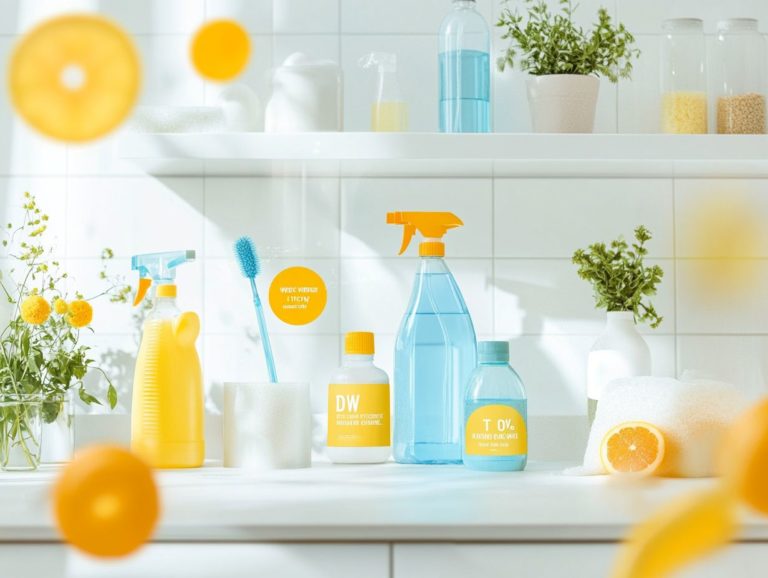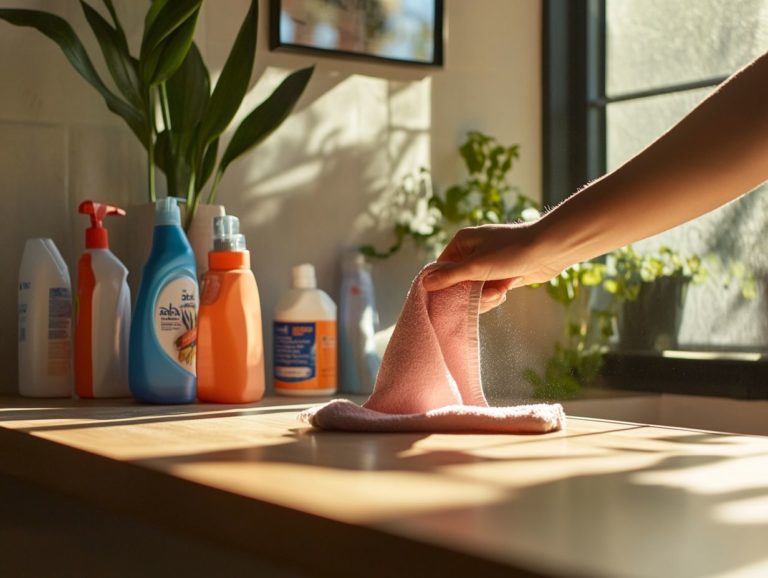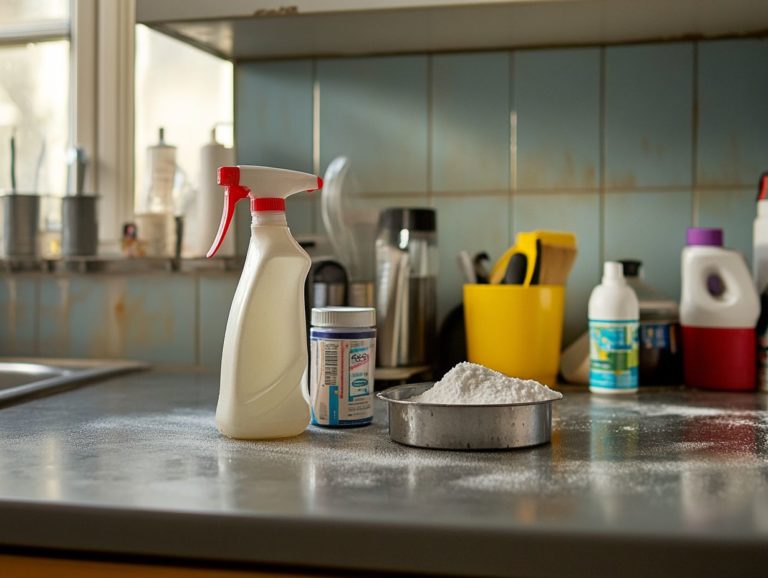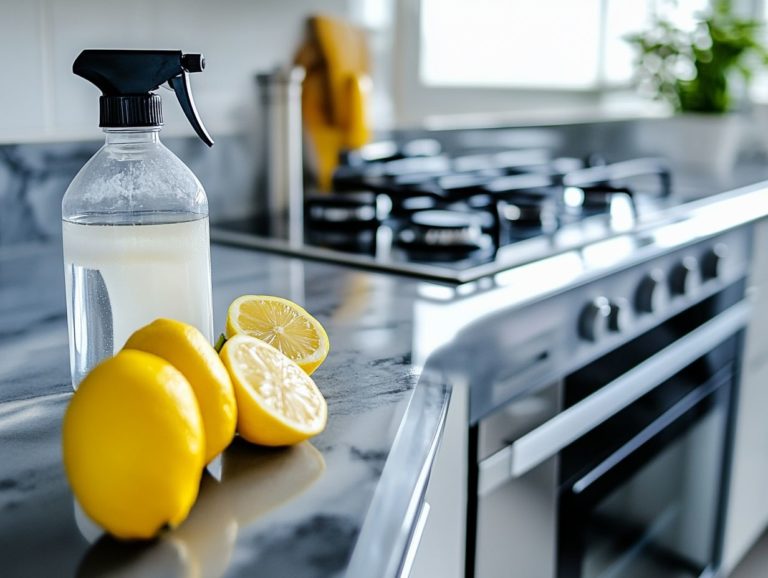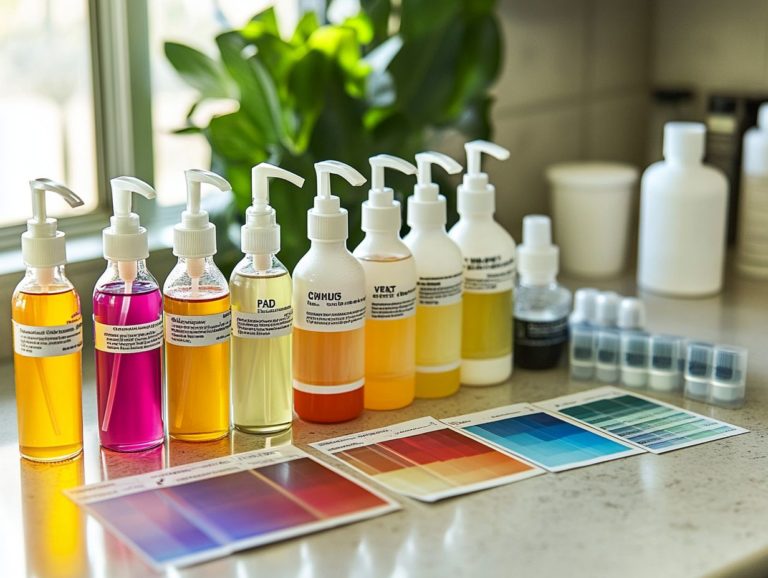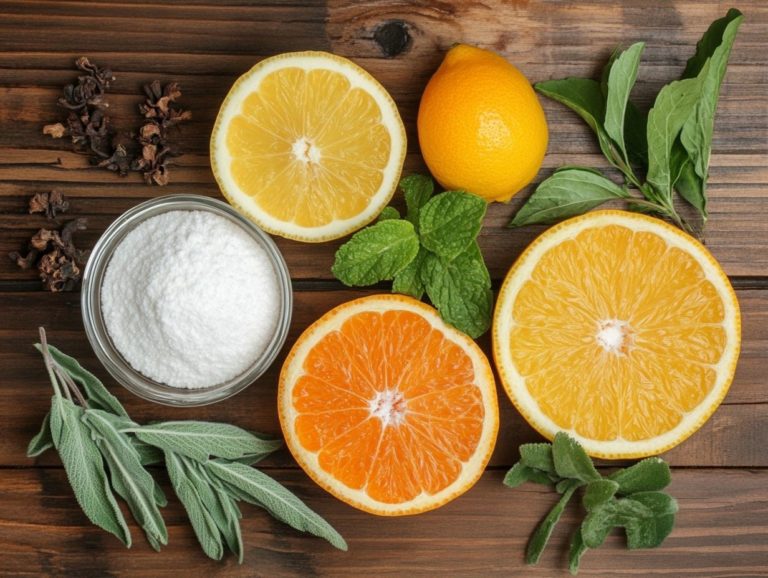How to Clean with Essential Oils Safely?
Essential oils have become quite the sensation, celebrated not only for their enchanting aromas but also for their remarkable cleaning capabilities as natural cleaning products.
In this exploration, you ll discover what essential oils are and how you can harness their power for effective cleaning throughout your home. You ll gain insights into the benefits, essential oil safety, and necessary precautions, while uncovering the best oils suited for various cleaning tasks.
Get ready to discover practical tips that will transform your cleaning routine!
We will guide you on sourcing high-quality essential oils and recommend reputable brands, ensuring that your cleaning endeavors are both safe and effective. Dive in now and revolutionize your cleaning habits today with the natural prowess of essential oils!
Contents
- Key Takeaways:
- What Are Essential Oils?
- How Can Essential Oils Be Used for Cleaning?
- What Are the Safety Precautions When Using Essential Oils for Cleaning?
- What Are the Best Essential Oils for Cleaning?
- How to Make DIY Cleaning Products with Essential Oils?
- Where Can You Buy High-Quality Essential Oils for Cleaning?
- Frequently Asked Questions
- How to Clean with Essential Oils Safely?
- Can I use any essential oil for cleaning?
- How do I dilute essential oils for cleaning?
- Can I use essential oils on all surfaces?
- How do I make an all-purpose cleaner with essential oils?
- Are there any safety precautions I should take when using essential oils for cleaning?
- Can I use essential oils to replace other cleaning products?
Key Takeaways:
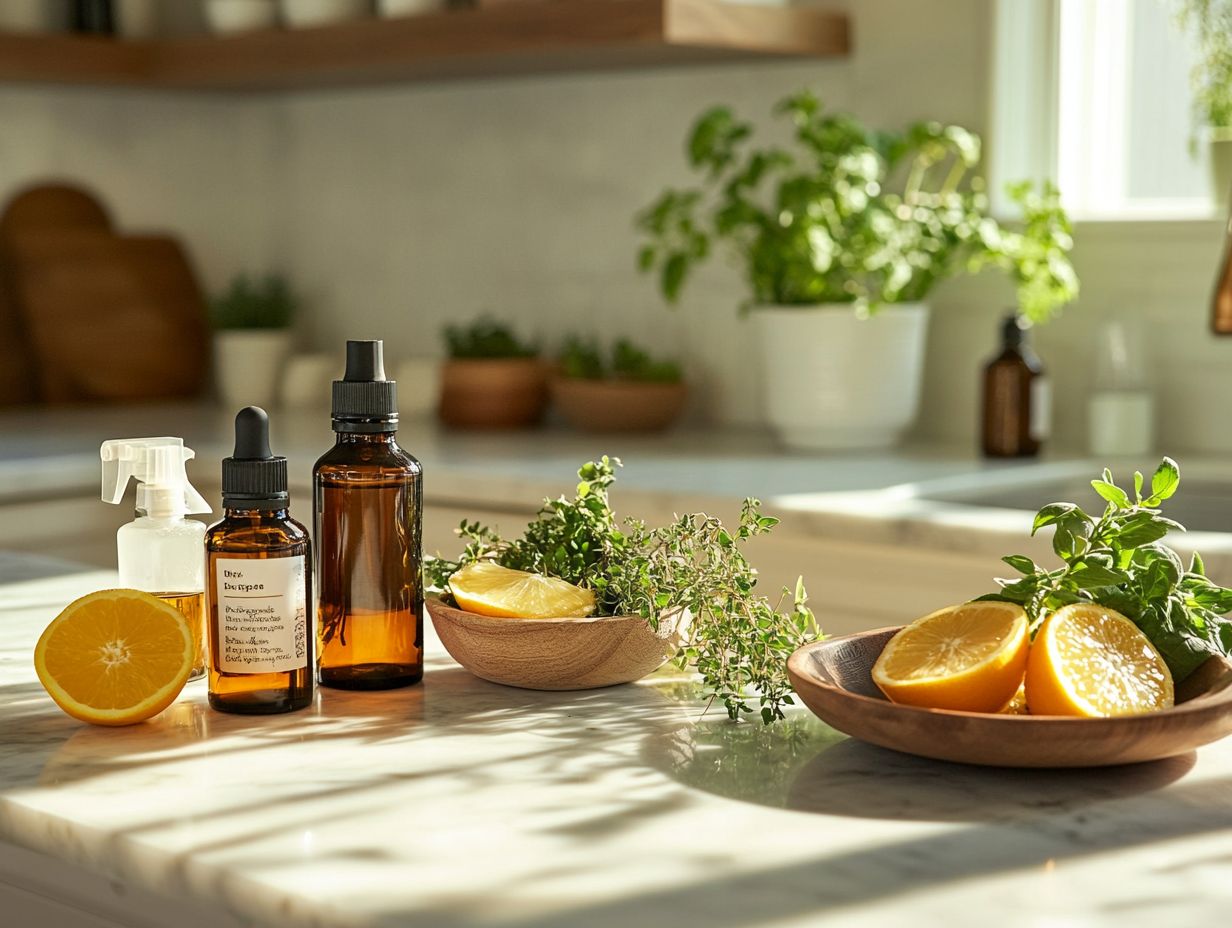
- Use essential oils for cleaning to reap their benefits, such as natural disinfection and pleasant scents.
- Handle essential oils with caution by knowing the potential risks, such as ingestion and topical application.
- Create DIY cleaning products using essential oils for a safer and healthier alternative to store-bought cleaners.
What Are Essential Oils?
Essential oils are concentrated extracts derived from plants, capturing the essence and beneficial qualities of various flowers, herbs, and botanicals. With a wide range of applications from enhancing your use of scents to improve mood and health to elevating your cleaning routine these oils are revered for their germ-fighting abilities and remarkable versatility.
You may find yourself drawn to popular essential oils like lavender, eucalyptus, and tea tree oil. They’re not just delightful to the senses, but they also offer a wealth of health benefits and aromatic properties, making them staples in many homes.
By grasping the significance of these organic oils, you can unlock their full potential for wellness and effective natural cleaning solutions, such as creating your own all-purpose cleaner.
How Can Essential Oils Be Used for Cleaning?
Essential oils present a sophisticated and environmentally friendly alternative to commercial cleaning products, offering robust cleaning solutions infused with germ-fighting abilities. By incorporating essential oils such as tea tree and lavender into your cleaning regimen, you can craft DIY cleaning recipes that are not only effective but also promote a safe home environment.
These natural cleaning techniques allow you to replace harsh chemicals, transforming your cleaning routine into a healthier practice for both your family and the planet, thanks to the non-toxic cleaners you can create with essential oils.
What Are the Benefits of Cleaning with Essential Oils?
Cleaning with essential oils provides many benefits, including effective disinfection and a healthier indoor environment. These oils are packed with powerful antibacterial properties, making them superb natural alternatives to traditional cleaning products that often harbor harmful chemicals.
Their delightful aromas elevate the cleaning experience, leaving your home smelling fresh and inviting with citrus scents and other pleasing fragrances. By incorporating essential oil blends into your cleaning routine, you can also gain additional health benefits, like stress relief and improved air quality, especially when using scent diffusers to disperse the aromas.
Beyond their natural fragrance and purifying abilities, these oils can uplift your mood, transforming mundane chores into a more enjoyable experience. Using oils like tea tree or eucalyptus not only helps eliminate germs but also supports your respiratory health by reducing indoor pollutants.
Blending essential oils such as lavender or lemon can create a calming atmosphere that enhances your overall well-being. Additionally, using essential oils like peppermint or rosemary can invigorate your senses, making cleaning a more dynamic activity.
The versatility of these oils allows you to customize your cleaning solutions, ensuring that both cleanliness and your personal health are prioritized with every spray and wipe. Whether you create an all-purpose cleaner, a disinfectant spray, or a surface scrub, essential oil combinations can cater to various cleaning needs.
What Are the Safety Precautions When Using Essential Oils for Cleaning?
Essential oils offer a wealth of benefits for cleaning, but it’s imperative to grasp the safety precautions necessary to prevent any potential health concerns. You must apply essential oils properly to avoid allergic reactions and skin irritations. This is especially important if you have sensitivities. Proper essential oil storage is also crucial to maintaining their efficacy and safety.
Be careful when handling and storing concentrated essential oils. This is especially important in homes with children or pets. By adhering to essential oil safety guidelines and conducting thorough essential oil research, you can fully enjoy the advantages of natural cleaning without jeopardizing your health or well-being.
What Are the Risks of Ingesting Essential Oils?
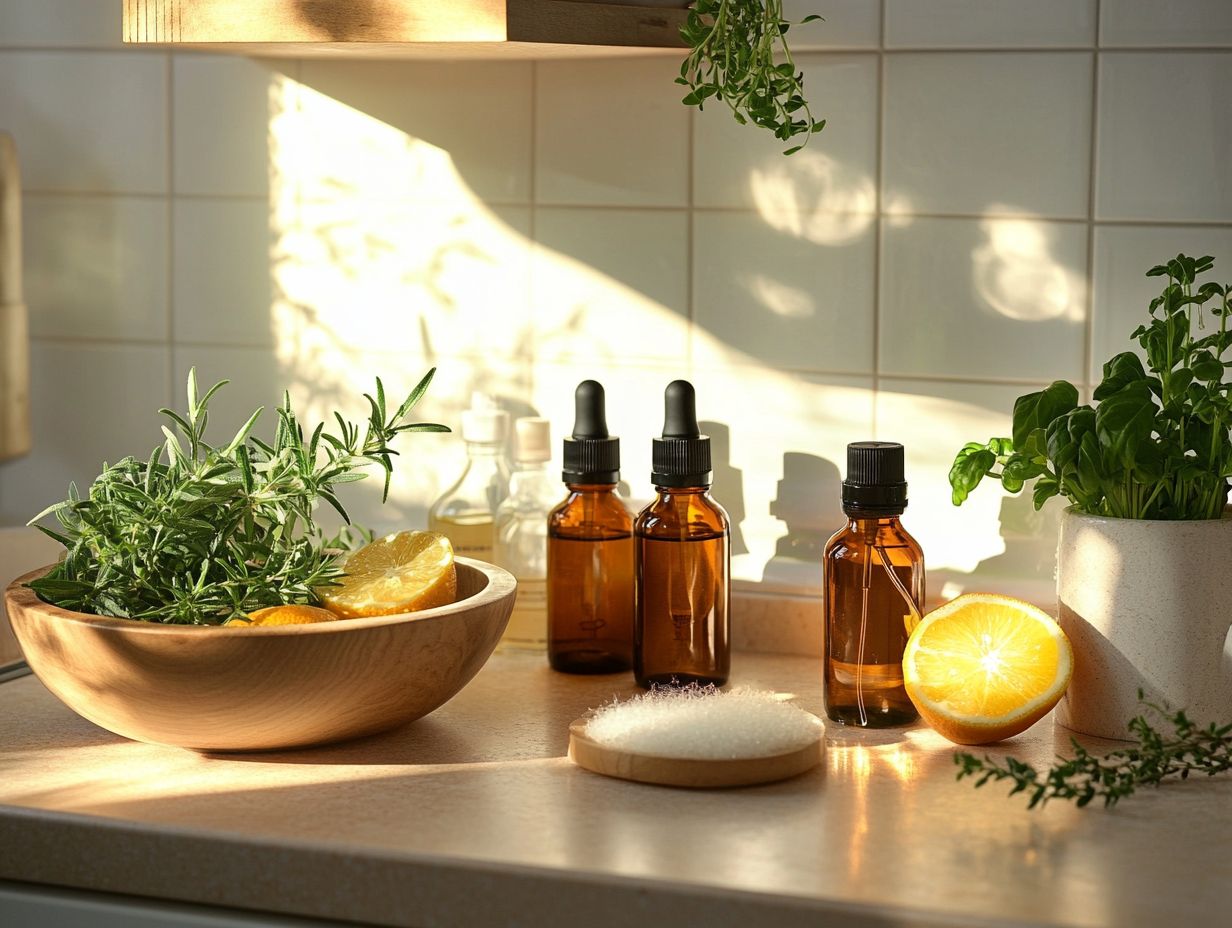
Ingesting essential oils can bring about significant health risks. These concentrated substances may lead to toxic or allergic reactions if consumed improperly. Remember, essential oils are primarily designed for topical or aromatic use. Consuming them in concentrated forms can trigger serious health concerns. Not all essential oils are safe to consume, so it’s vital to know which ones are! Those that are should only be taken under the guidance of a qualified health professional. Always follow essential oil instructions carefully for safe usage, particularly concerning ingestion.
The potential dangers of consuming these potent extracts can manifest in various symptoms. These range from gastrointestinal distress like nausea and vomiting to more severe reactions such as organ damage or respiratory issues. In some cases, individuals may even face anaphylaxis a life-threatening allergic reaction after ingesting certain oils. Therefore, don’t take any chances with your health! Adhere strictly to safety protocols regarding essential oil use and consult healthcare providers experienced in aromatherapy before considering ingestion. This helps mitigate any health concerns related to improper use of essential oils.
Taking these precautions not only protects your health but also enhances the overall therapeutic experience associated with these powerful plant derivatives. Essential oil precautions are essential to prevent adverse effects and ensure safe usage.
What Are the Risks of Topical Application of Essential Oils?
In terms of applying essential oils topically, it s important to recognize that there are risks involved. This is particularly true for potential allergic reactions and skin irritations for those with sensitive skin. While you may be drawn to the numerous health benefits and delightful aromas these oils offer, misapplication or using oils that aren t properly diluted can lead to unwanted side effects. Testing for skin sensitivities before applying essential oils directly is essential. Adhering to recommended guidelines for safe usage is also critical. Consulting essential oil brand recommendations can help you choose the safest and most effective products.
Many essential oils require dilution with a base oil, like coconut or jojoba oil, prior to application. Typically, this dilution should be at ratios ranging from 1% to 5%, depending on the oil’s strength and your skin type. Ignoring these dilution recommendations may heighten the risk of negative reactions, such as redness, swelling, or rashes. A patch test, where you apply a small amount of diluted oil to a discreet area of skin, can help you gauge how your skin will respond to the essential oil. Following essential oil application guidelines ensures safe and effective use.
Taking these precautionary steps ensures that your experience with essential oils is both safe and enjoyable. This allows you to reap their benefits without the worry of adverse effects.
What Are the Risks of Using Essential Oils Around Pets?
When you choose to use essential oils around your pets, it’s important to consider the potential risks certain oils may pose to their health. Many essential oils can be toxic to cats and dogs, leading to serious health issues if inhaled or absorbed through their skin.
To create a safe environment for your furry companions, you should research which essential oils are safe for pets and understand the proper methods for applying them in your home. This research is vital to avoid negative effects on pets.
Essential oils that are generally regarded as safe for pets include lavender, chamomile, and frankincense. These oils can offer calming effects without triggering negative reactions. Always use these oils in a well-ventilated space for a fresh and safe environment! Remember to keep them out of reach of your pets and to dilute them before application. Essential oils for pets should be used carefully to prevent health concerns.
Act quickly if you notice your pets showing signs of discomfort, such as excessive drooling, vomiting, or unusual behavior, as these may indicate negative reactions. Proper essential oil storage is also crucial to keep these substances out of reach of pets.
By learning how to use essential oils safely and keeping a watchful eye on your pets, you can create a soothing atmosphere without jeopardizing their health. Essential oil precautions and proper handling are key to safe usage around pets.
What Are the Best Essential Oils for Cleaning?
When it comes to cleaning, some essential oils truly shine for their remarkable effectiveness and antibacterial properties, making them excellent choices for natural cleaning solutions. Popular essential oils for cleaning include lavender, eucalyptus, tea tree, and lemon, all known for their powerful cleaning abilities.
Oils like tea tree, eucalyptus, and lemon are celebrated for their cleaning capabilities, while lavender essential oil not only provides a thorough cleanse but also infuses your home with a calming aroma. Rosemary and peppermint essential oils are also effective for cleaning while offering refreshing scents.
By understanding which essential oils to integrate into your cleaning routine, you can enhance both cleanliness and overall well-being, especially when choosing options that are safe for your pets.
What Are the Properties of Each Essential Oil?
Each essential oil you encounter has unique properties that enhance its effectiveness in cleaning and promoting health. For example, tea tree oil is known for its strong antibacterial properties, making it a powerful disinfectant. Meanwhile, eucalyptus essential oil provides a refreshing aroma along with natural cleansing benefits.
By understanding these characteristics, you can easily choose the right essential oils for various cleaning tasks while enjoying their health benefits and aromatic properties.
Lavender essential oil is popular not only for its calming scent but also for its antifungal and antiseptic qualities, making it perfect for creating a serene and hygienic environment. Lemon essential oil, with its bright and uplifting fragrance, sharpens mental clarity while acting as a natural degreaser and stain remover, a staple in many kitchen cleaning solutions.
Incorporating these versatile oils into your daily cleaning routines elevates the cleaning experience with their delightful scents while promoting a healthier living space, free from harsh chemicals and toxins. Using essential oils can help keep your home clean and healthy.
How Can Each Essential Oil Be Used for Cleaning?
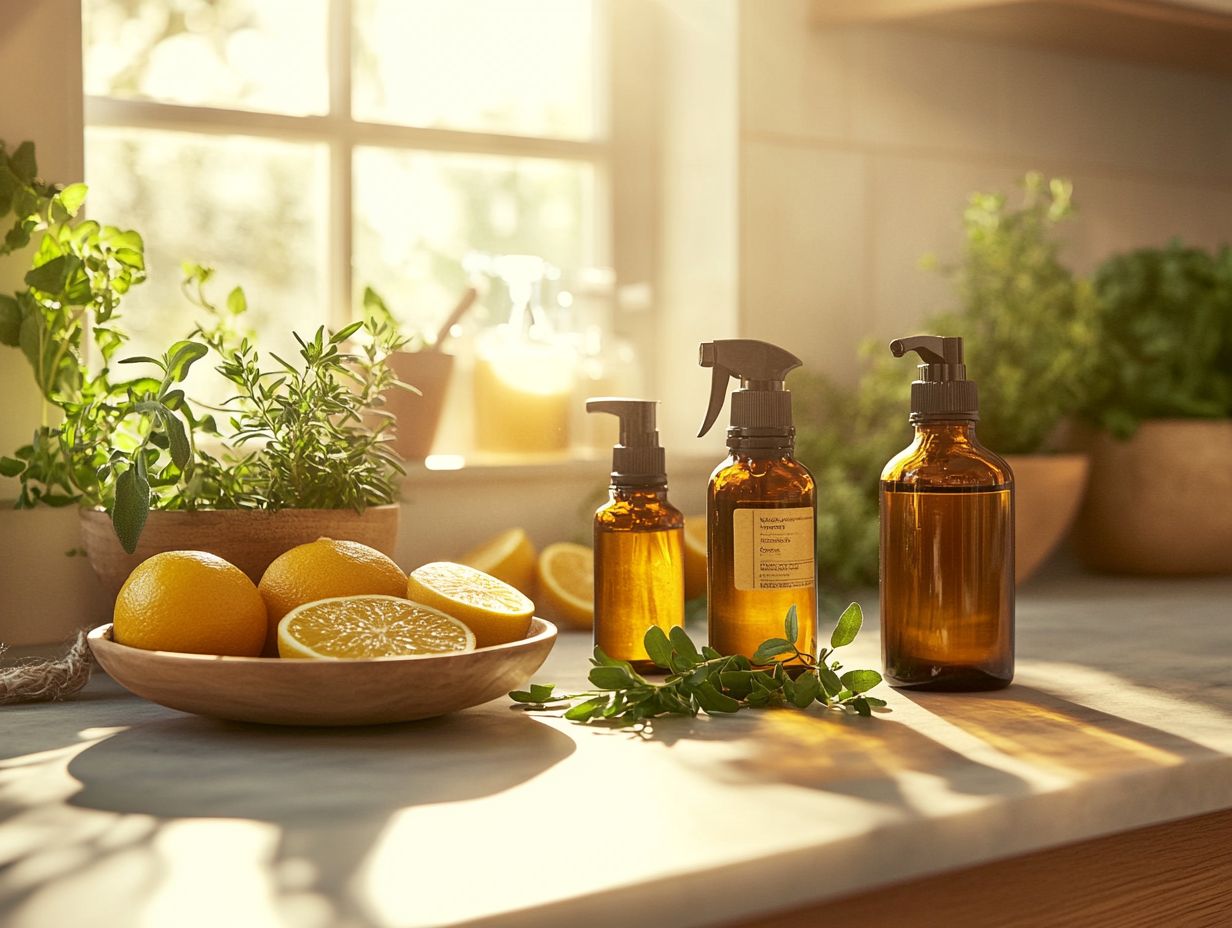
Each essential oil offers a wealth of possibilities for various cleaning tasks. They provide distinct benefits that align with their unique properties.
For instance, use lavender essential oil to create a calming all-purpose cleaner. Tea tree oil excels at disinfecting surfaces.
Eucalyptus oil is great for purifying the air with its strong antibacterial benefits. Understanding how to integrate these oils can make cleaning both effective and enjoyable.
Transform cleaning from a mundane chore into a delightful experience!
With just a few straightforward recipes, you can harness the remarkable power of these oils. To create a refreshing lemon cleaning spray, combine 10 drops of lemon essential oil with water and vinegar in a spray bottle.
This mixture cuts through grease and leaves a bright, fresh scent characteristic of citrus. Eucalyptus oil can enhance your laundry routine, adding antibacterial benefits and a crisp aroma.
It can also be used in household cleaners for a fresh scent and added cleaning power. For a natural carpet deodorizer, mix baking soda with a few drops of your favorite essential oil, such as peppermint or lavender.
Sprinkle it generously on the carpet and let it sit before vacuuming. Incorporating these essential oil applications can transform cleaning into a holistic practice.
This nurturing approach promotes a pristine home and a soothing environment while ensuring you use safe, non-toxic cleaners.
How to Make DIY Cleaning Products with Essential Oils?
Crafting DIY cleaning products with essential oils is simple and rewarding. You can tailor your solutions while avoiding harsh chemicals.
Natural alternatives offer numerous health benefits. Combine essential oils with ingredients like vinegar, baking soda, or Castile soap, a gentle soap made from vegetable oils, to create effective cleaners.
Whether you re making an all-purpose cleaner or a specialized blend, the possibilities are truly limitless. Different essential oil combinations can enhance both the effectiveness and fragrance of your products.
What Are Some Recipes for Cleaning Products Using Essential Oils?
Discover effective DIY cleaning recipes that harness essential oils. For example, whip up a simple all-purpose cleaner by mixing vinegar, water, and a few drops of tea tree oil.
This cleaner boasts antibacterial properties and refreshes your space with a pleasant scent. Mixing baking soda with lavender essential oil creates a gentle scrub for surfaces needing extra cleaning power.
These recipes are eco-friendly alternatives to commercial cleaners. When facing stubborn grease, blend lemon juice with distilled vinegar and eucalyptus oil to cut through grime effortlessly.
This combination leaves behind a delightful citrus fragrance. To deodorize carpets, mix equal parts baking soda with your favorite essential oils like peppermint or citrus.
Lightly sprinkle before vacuuming to refresh your carpet fibers. Using essential oils for home cleaning is a fantastic way to create a fragrant haven!
What Are the Steps to Make DIY Cleaning Products with Essential Oils?
Creating your own DIY cleaning products with essential oils is a simple yet rewarding endeavor that yields effective and safe cleaning solutions. Begin by selecting your preferred essential oils, considering both their unique properties and delightful scents.
Next, gather essential ingredients like vinegar or baking soda, measuring them according to your chosen recipe. Following essential oil instructions carefully ensures that your DIY recipes are both effective and safe.
Combine everything in a suitable container, label your creation, and store it properly for future use.
To amplify your cleaning power, think about incorporating other natural ingredients like lemon juice, which boasts antibacterial properties, or castile soap, celebrated for its versatility. Natural ingredients like lemon juice and castile soap blend easily with essential oils.
As you mix your ingredients, it’s essential to adhere to precise measurements to ensure effectiveness and prevent any unwanted reactions. Always remember to wear gloves and work in a well-ventilated area to shield yourself from irritation caused by strong scents or acidic components.
Once your concoction is ready, seal the container tightly to protect the essential oils from degradation, and store it in a cool, dark place. Follow these simple steps, and you ll create exciting, non-toxic cleaning solutions that are safe for your home!
Where Can You Buy High-Quality Essential Oils for Cleaning?
Finding high-quality essential oils for your cleaning endeavors is crucial for ensuring both effectiveness and safety in your DIY recipes. Reputable essential oil brands provide pure and organic oils that are perfectly suited for cleaning applications. Purchasing organic essential oils from trusted brands ensures you get the best quality.
As you embark on your search for these oils, consider exploring local farmers’ markets or community co-ops these places often feature locally sourced products that can surprise you with their quality. Holistic health stores are another excellent option, typically offering certified organic choices that guarantee potency and purity.
You can also find options at online retailers like Plant Therapy or Rocky Mountain Oils, which boast extensive selections, complete with detailed descriptions and customer reviews that enable you to make informed choices. Platforms like Amazon also offer a wide range of essential oil brand recommendations.
By prioritizing trusted brands, you not only enhance your cleaning experience but also support sustainable practices that resonate with your environmentally-friendly values. This aligns with essential oil research that highlights the benefits of using high-quality, pure oils.
Frequently Asked Questions
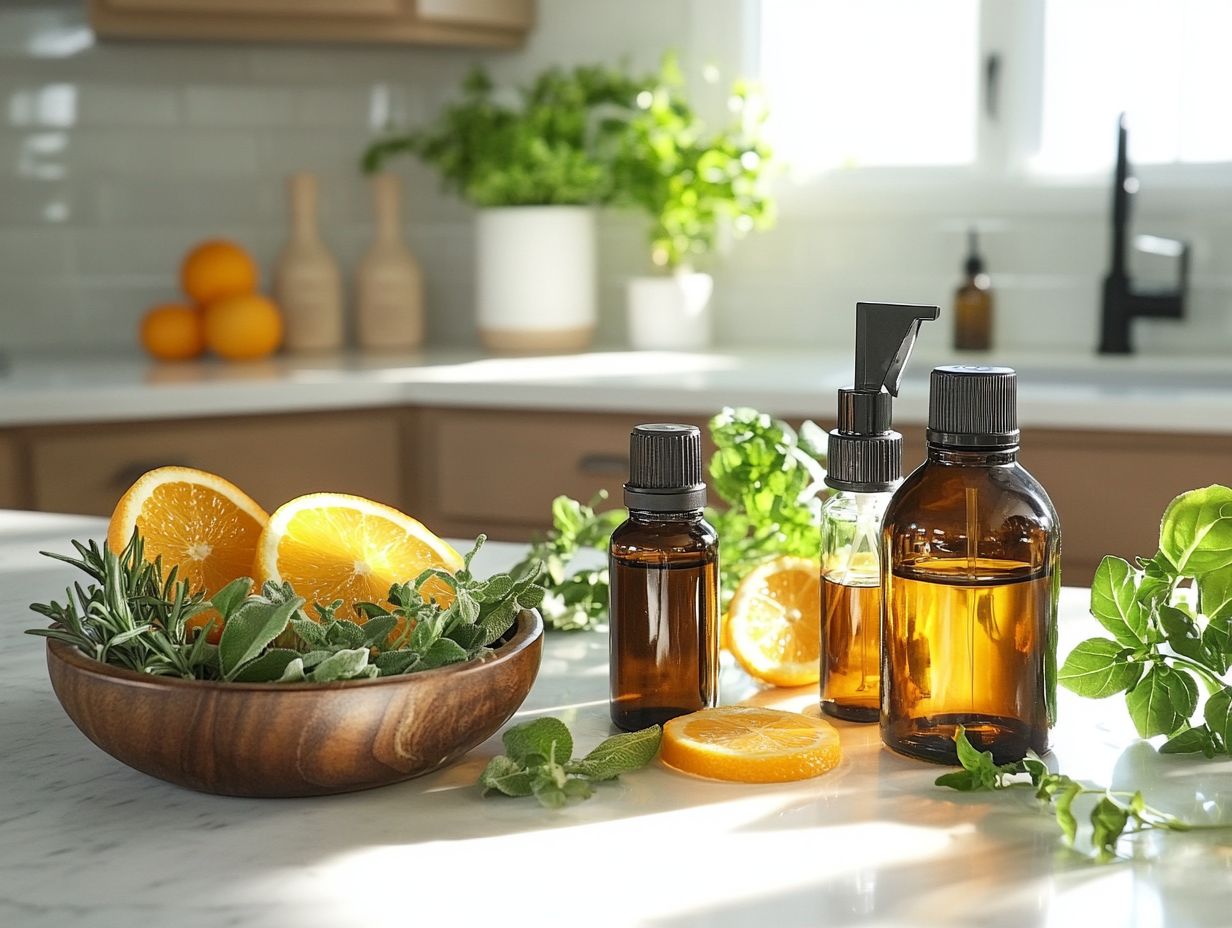
How to Clean with Essential Oils Safely?
Cleaning with essential oils is becoming increasingly popular due to their natural and non-toxic properties. However, it’s important to use them safely to avoid any potential hazards. Here are some FAQs to help you clean with essential oils safely and make the most of their essential oil benefits.
Can I use any essential oil for cleaning?
Not all essential oils are suitable for cleaning. It’s important to choose oils that have antibacterial, antiviral, and antifungal properties, such as tea tree, lemon, eucalyptus, and lavender. These essential oil properties ensure effective cleaning solutions.
How do I dilute essential oils for cleaning?
Undiluted essential oils can be too strong and cause skin irritation. To dilute them, mix a few drops in a carrier oil (which helps to spread the essential oil) such as coconut or jojoba oil, or dilute in water for surface cleaning. Always follow essential oil instructions to ensure proper dilution and application.
Can I use essential oils on all surfaces?
Some surfaces, such as wood or granite, may be sensitive to certain essential oils. Always do a patch test first to keep your surfaces safe and sound! Avoid using oils on delicate surfaces. Citrus oils should also not be used on plastic or rubber as they can cause damage.
Start creating your DIY cleaning solutions today and enjoy a fresher, healthier home!
How do I make an all-purpose cleaner with essential oils?
Mix 1 cup of water, 1/4 cup of white vinegar, and 10-15 drops of your chosen essential oils in a spray bottle. Shake well before use.
Use it to clean surfaces in your kitchen and bathroom. This multi-purpose cleaner is a great way to use essential oils for home cleaning.
Are there any safety precautions I should take when using essential oils for cleaning?
Essential oils are generally safe to use, but it’s important to handle them with care. Always keep them out of reach of children and pets.
Avoid contact with eyes and do not ingest them. This is crucial for essential oil safety to avoid any health concerns.
Can I use essential oils to replace other cleaning products?
Switching to essential oils can transform your cleaning routine and make it healthier! They may not have the same strength to remove tough stains and bacteria as store-bought cleaners.
Start using essential oils alongside your regular cleaners today for a fresher home!

